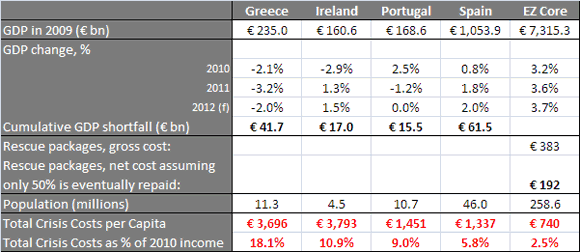I tend to think about it like this. The eurozone crisis imposes costs on the periphery countries (Greece, Ireland, Portugal, Spain) through the austerity and resulting recessions they have been forced to impose upon themselves. And the crisis imposes costs on the core countries (France, Germany, Benelux, Austria, Finland) through the rescue packages that they have been forced to cobble together.
I’ve argued before that I think that since the benefits of the euro have been enjoyed by all memebers of the eurozone (EZ), the costs of the crisis should also be shared among the members of the EZ. To what degree has that happened? Let’s see if we can come up with some sort of rough estimate.
To figure the costs to the periphery countries, I measure the GDP shortfall between those countries and the rest of the EZ during the years 2010-12 using data from Eurostat. (But note that the 2012 GDP growth rate is a forecast, and as such is nothing more than an educated guess on my part.) So for example, over those three years Greece will have had approximately €42 billion less income than it would have had without the crisis, i.e. if it had enjoyed the same economic growth as the EZ core. Dividing this by the Greek population yields a cost of about €3,700 per person, or about 18% of annual income.
To estimate the costs to the core EZ countries, I add up the various rescue packages agreed to so far, including the most recent (July 2011) €110 billion plan for Greece. (Though it’s worth noting that the July 2011 plan has not actually been approved by all EZ member countries, and final details are yet to be worked out, so I’m not sure that it’s quite a done deal.) Most of this assistance is in the form of loans; after all, the idea was that these rescue packages were primarily supposed to just see the periphery countries through a liquidity crisis. As such, much of this assistance is due to be repaid. But to be as generous as possible to the EZ core countries in this reckoning, let’s assume that such repayments never amount to more than 50% of the package totals.
The following table summarizes these very rough estimates of the burden that the crisis has imposed on the members of the EZ so far.

Assuming that the July 2011 agreement is indeed approved and the money is actually handed over to Greece, then the crisis will have cost about €740 per capita in the EZ core, or about 2.5% of annual income in 2010. For the periphery countries, the cost of the crisis ranges between about €1,300 and €3,700, depending on the country, or between 6% and 18% of one year of average income.
If you believe that solving the EZ crisis is a matter of shared responsibility — and since the crisis was largely the result of forces beyond the control of the EZ periphery, that seems a reasonable conclusion — then then these figures are badly askew. At the very least, they suggest that any additional costs imposed by this crisis should henceforward be paid for primarily by the EZ core. The periphery has already paid its dues, and then some.



Leave a Reply